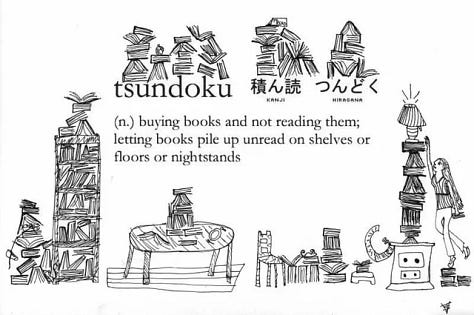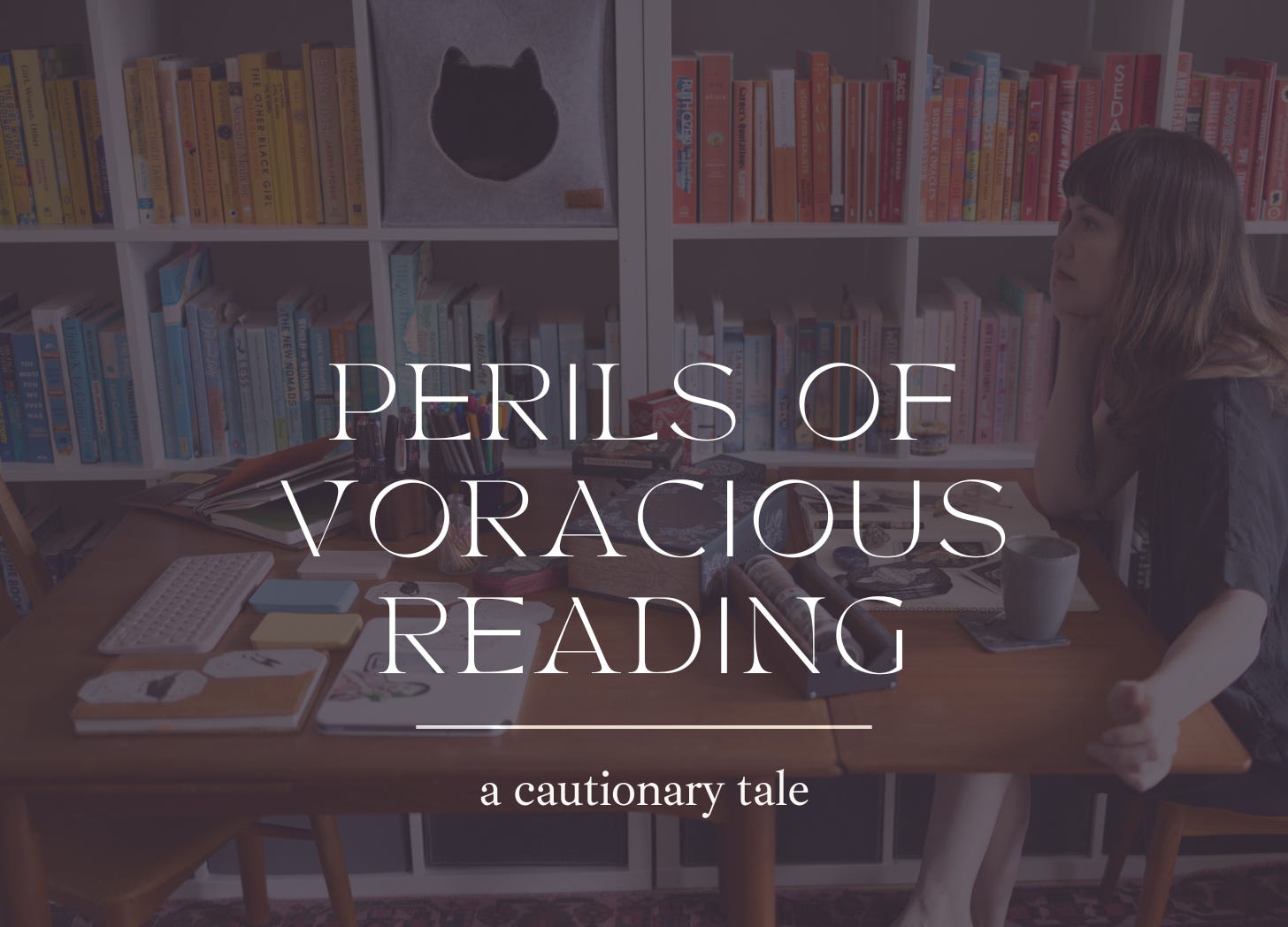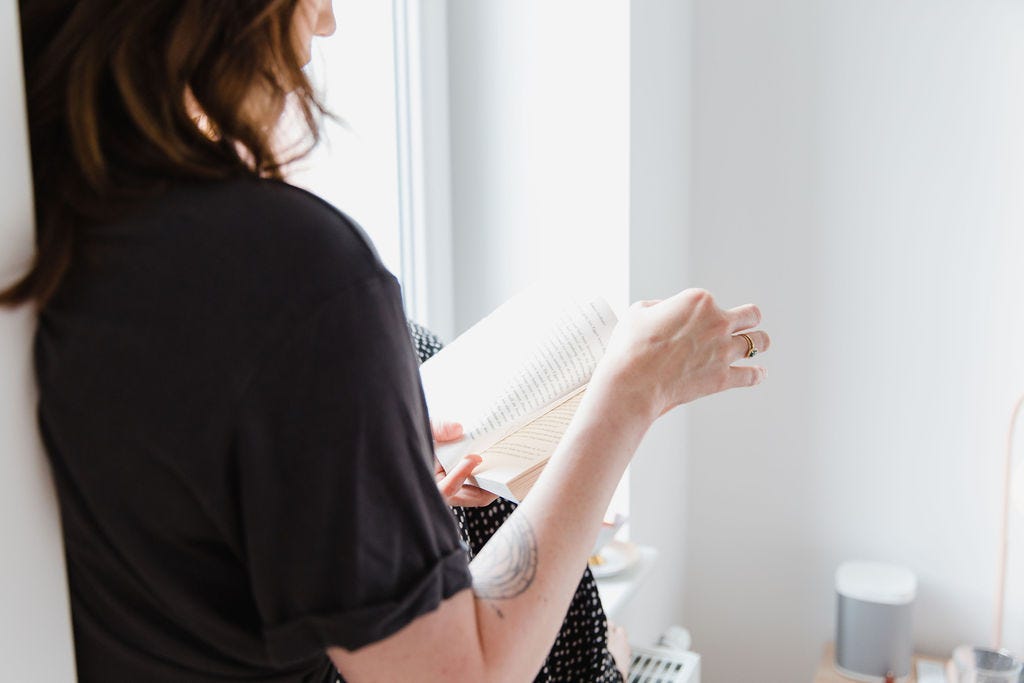The perils of voracious reading
What happens when ideas have nowhere to go, a cautionary tale
I’ve always been a book addict.
I’ve just returned from nearly a week in London with only three new1 books. Upon hearing this news, I fully expect multiple friends to treat me like I’m a pod person. My obsession with books is a significant part of my identity. Nearly everyone I know sends me any post they see with the Japanese term tsundoku.



My friends and loved ones are right to be concerned. However, in my defense, I do read quite a lot. The book collecting outpaces my reading, but not by a massive stretch. I’ve set new rules I’m following diligently, as outlined in my recent post on cataloguing my unread books.
However, this has led me to a new question:
What are voracious readers seeking?
How strange that this question has never occurred to me before. I’ve simply carried on devouring books and hunting for new ones in bookshops, libraries, second-hand stores, and even on friends’ bookshelves. I spend a lot of time swapping tips on how to get more reading done, as people ask about this all the time. (My friend Susannah Conway recently wrote a lovely post on just this topic if you need help finding time for books.)
The desire to read is as strong for me as the desire to eat. My mother often commented that I ate books. It is a survival-level need, as far as my nervous system is concerned. It’s only recently that I’ve realized it has been my anxiety management tool of choice ever since I understood letters formed words and words formed stories.
Upon reflection, I see one or more of the following hopes present when I read:
Escape. The world is stressful, and with a hair-trigger nervous system that makes me scream when our very loud doorbell rings, I am often craving control over my environment. Being able to exit my present reality into a book (some films create this effect as well) is a daily necessity for me. This is most possible with fiction.
Learning. New information gives so many of us joy. I’ll happily read giant books on topics that interest me (textile history, anyone?) and slurp up the facts like tasty noodles. However, I often remain voracious after reading, as the new input has nowhere to live in my memory, requiring more furious reading.
To feel better. My friend Anka Hoerster, a long-time serious practitioner of Buddhism, said that when she has hunted for books, she “wanted to be in the mind and the voice of the writer … I can be in the sanity of the writer.” She got this last idea from teacher Tara Brach, who shared that writers hold sanity for their readers.
To get another take. We all have blind spots, and reading allows us to seek new perspectives without taking up anyone’s time. I read to get closer to experiences, either because the author lived in a different time period, a different place, or comes from a different background than mine and they are the authority on that experience.
As building blocks for my writing. Reading is half of a conversation. In looking at why I read, I’ve circled back around to writing, as I always do. Reading is the foundation of writing. I read to find sparkles that inform, delight, enrage, and inspire me to respond.
Reading is the first half of a conversation.
Sometimes, after a very intense period of reading, I get blocked. This is a horrible state, in which I cannot settle on to a new book. In these moments, I drift around in front of my bookshelf, unable to find anything exciting, much like the feeling of having nothing to wear in front of an entire closet of clothes.
I know it’s dire when I go to a bookshop and the feeling persists. Everything appears grey and lackluster. Nothing grabs me and all excitement has leaked away.
In the past, this felt like a sign of burnout or an episode of depression looming, however experience has taught me that this is only the case when I try to muscle through.
What is really happening is an overload of mental fodder I’ve done nothing with, like having eaten an enormous meal and trying to stuff more down before digesting.
How do I digest? By writing.
My friend Anna Brones recently asked a dangerous question, inquiring about note-taking practices regarding reading, and I got so excited I nearly tried to fire up a video call right then, despite being about to board a plane.
My belief is that we read so much, and are desperate for tips on how to read more, because we are all treasure-hunters. We all read because we want the glimmer of a new idea, a solution to a problem, of a bright glimmering moment that will break us out of a thought spiral. For writers, this treasure unfolds into new writing, and the conversation continues.
The problem is, if we don’t save our treasure in some form, we don’t have it when it’s time to write, and we panic, hunting for more and more and more reading.
Please know, I am not suggesting you read less, if you are happy with your reading, or simply desperate to spend more time doing it. What I am learning, however, is that reading feels more satisfying for me if I have a way to hold on to the treasures I find.
I often benefit just as much from re-reading something I loved (and learning more about what I love about it) as I do scrambling around for a new fix.2
How can we build a treasure chest of ideas? With notes.
Many excellent note-taking systems exist.
The following resources have been, in many cases, game-changing:
Tiago Forte’s Building a Second Brain (I took the course and read the book)
Ruby Granger’s take on commonplacing (my response with a link to her here).
Brandon Taylor’s thoughts on note-taking, recommended by a friend.
I am fascinated by Zettlekasten, and particularly enjoyed this digital version.
Jillian Hess has an entire substack, Noted, sharing various people’s notebooks.
The danger with all these methods, I’ve found, is that it’s really common for me to get obsessed with a system and geek out on the process, rather than determining my own needs and adapting the tools to fit.
This post begins a series on archiving your reading
Both in the sense of metabolizing, but also in the sense of creating meaningful archives3 that you can reference for writing.
For the tech phobic: I am not a total digital junkie. I use notebooks actively, and they are a big part of my notes. Notebooks will be shared.
For the analog-overwhelmed: If you have 1,000 notebooks and books with scribbled comments in the margins, know I feel your pain. I have been there with so many notebooks I needed to tote them from room to room in my home. Lockdown was bizarrely a period of very heave bags to carry.
This is not a buttoned-up method.
I don’t have the answers, but I love puzzling out ways to make my reading more meaningful to my writing. I see this series as a way for us to explore this topic together, and my nerd heart is singing already.
Members: Have questions? Want me to cover anything in particular in these posts?
Requests welcome in the comments.
Archiving Your Reading post series
Not counting the ARC of a friend’s book and purchasing a hard copy of another friend’s new release that I’d already read in digital form. They will both be on the SLP this season, so I’m allowing myself to count them separately.
For more on the joys of rereading, I highly recommend Daisy Buchanan’s latest book, Read Yourself Happy, which we are discussing on the Secret Library this coming Thursday. ✨
Edited 18 February 2025, changing the word “Digesting” to “Archiving” as the imagery felt a bit gross to create a series name with 🙃






Wow! I’m new to your newsletter (discovered via Anna Brones’ newsletter) and I’m pretty sure that I’ve never felt so seen (and called out -tsundoku!!). Everything you describe and explore here hit home for me. I’m constantly experimenting with a hybrid approach to note-taking with both my Notes app and my piles of notebooks, so I would love to see any approaches that use both, and would also love to see any app recommendations. I also find non-fiction and fiction note-taking work differently for me, so any ideas to try on specifically for one/other would be welcome. I Love this series, excited to follow along!
Only 3 books after a whole week??? I’m shocked ;) I really do think I am having note taking angst this week (from lack thereof). Maybe this is the year I change things up!!